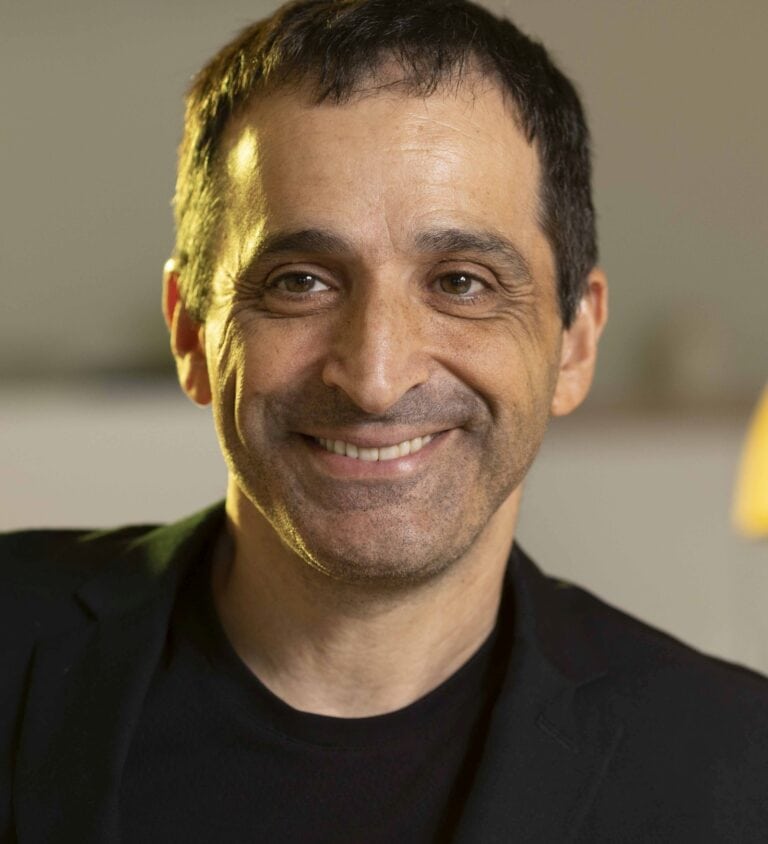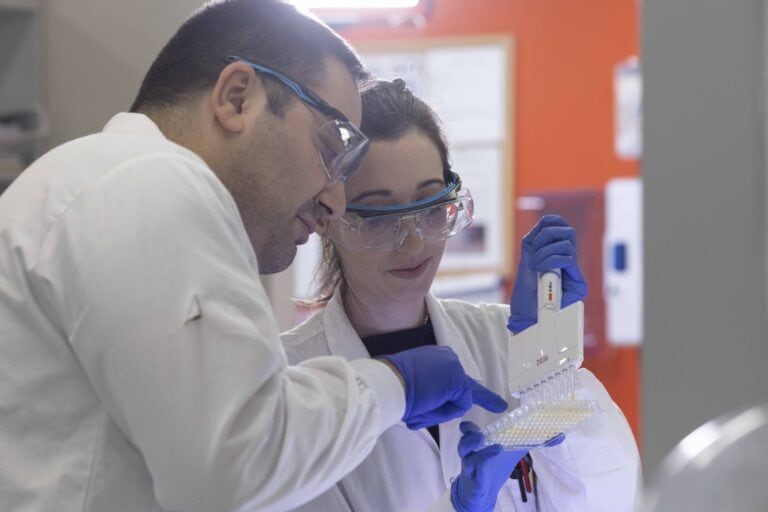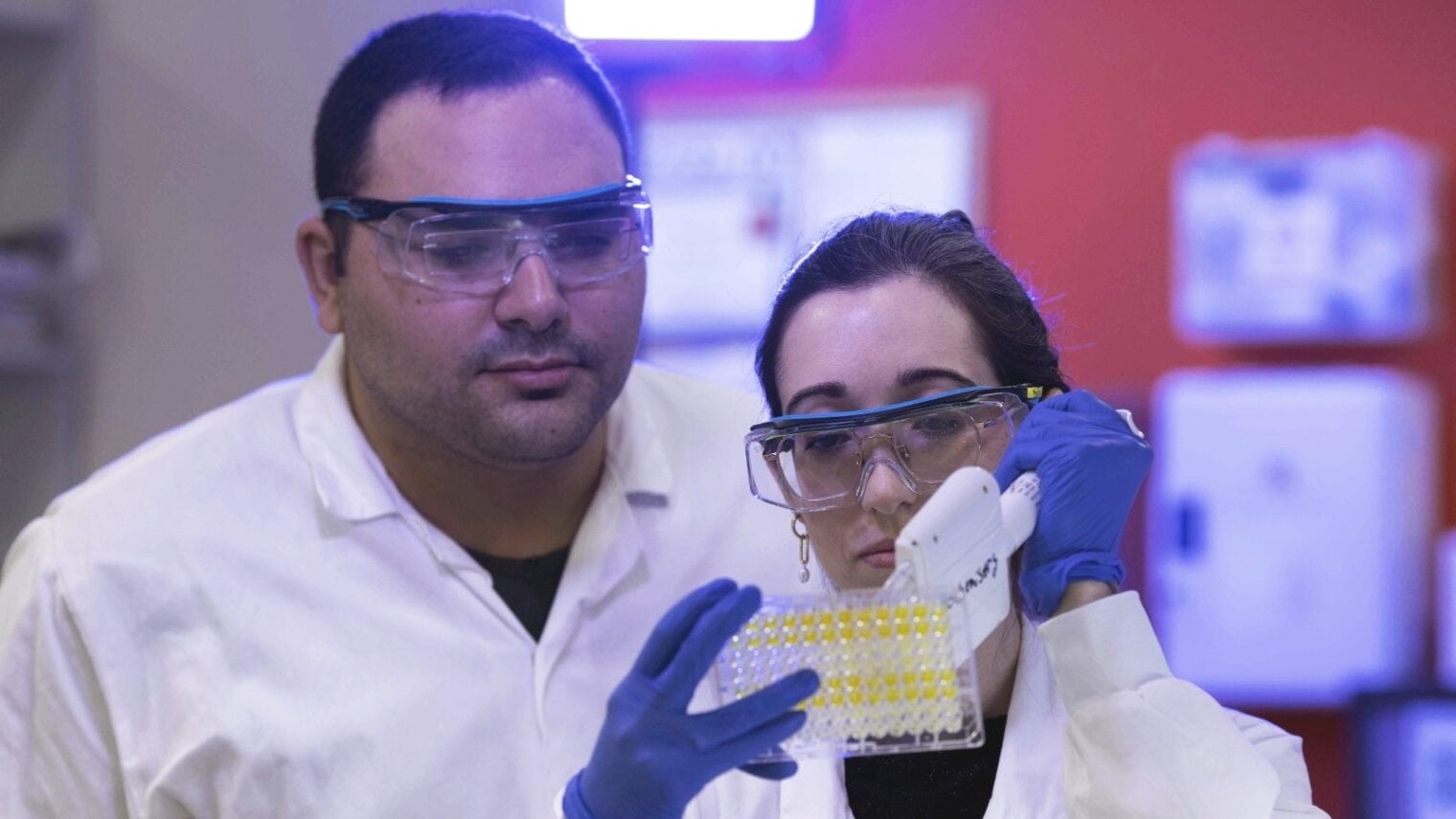Cancer drugs – chemotherapy and immunotherapy in particular – have done a remarkable job in saving lives and halting the progression of deadly diseases.
But as anyone who has had to suffer the indignity of the IV knows, those treatments are indiscriminate at best. They kill cancer cells, yes, but also healthy cells around them, leading to unwanted complications and side effects.
The reason for these undesired outcomes, Prof. Yanay Ofran tells ISRAEL21c, is that current treatments are “one-trick ponies” that perform a single function and aren’t particularly smart.
They are typically single molecules that can’t adapt their function to the context they find themselves in — encountering a tumor vs. healthy tissue, for example.
Ofran received his PhD in molecular biophysics and biomedical informatics from Columbia University. Following a stint at Stanford, he returned to Israel to head the systems biology and functional genomics lab at the Institute of Nanotechnology and Advanced Materials at Bar-Ilan University. His specialty: developing computational ways to study biomolecular recognition.
In less-technical terms, this means how proteins affect biology by binding to a specific target.
Ofran realized that he could create smart molecules that can “sense the environment and behave differently under different conditions. Such molecules, for example, can use features on the cell’s exterior and determine whether a certain cell is helping the tumor, and hence should be attacked, or is fighting the tumor and hence should be helped.”
An amazing drug

“If we can use computer science to understand how molecules interact, we may be able to use it to design molecules that ‘interfere’ with biological processes in a predetermined, prescribed way,” Ofran tells ISRAEL21c.
“If we could go into a patient’s body, find a tumor, switch the immune system on and off there, but not in other tissues, that would be an amazing drug.”
Ofran’s company, Biolojic, “programs” antibodies that activate cells to attack a tumor while at the same time stopping any cells that do the opposite.
“Instead of just reacting always with the same response in all tissues and at all times, we’re making antibodies that can act conditionally, meaning if the cells appear one way they do ‘x,’ and if they look another way they do ‘y,’” Ofran elaborates.
Such antibodies could, for example, “bind to one target under one set of circumstances and to another target under another set of circumstances.”
Good hijackers
“We wanted to design a drug that hijacks the existing channel of communication between immune cells so that if there is a cell that tries to pacify the immune system, we will not let it also pacify the immune attackers,” says Ofran.
“For cells that activate the immune system, we want them to receive messages that make them multiply and attack the tumor more viciously.”
Biolojic uses artificial intelligence (AI) to design its smart molecules in the lab. By tapping into billions of datapoints on how molecules perform specific tasks, Biolojic can, for example, develop an antibody that knows exactly when to release chemotherapy into a tumor micro-environment and when to hold back.
“These are all things that everybody knows antibodies can do,” Ofran says. “We’re just putting them together into one developable antibody.”

Is designing an antibody on a lab computer like using ChatGPT on our home computers?
“That’s actually a good way to understand what we’re doing,” Ofran says.
“With Google, if you wanted to find a poem about Jerusalem in the fall, you’d type in ‘Jerusalem’ and ‘fall.’ The only hits you’d get are existing poems someone wrote and posted on the Internet at some point in time.
“ChatGPT allows you to say, ‘Write me a poem about Jerusalem in the fall.’ Similarly, if in the past, tools could help screen existing molecules, we are generating molecules that never existed before and that do exactly what we want them to do.”
Unlocking potential
Antibodies are far more complex than simple drugs such as aspirin or Viagra, “which have 10 to 20 atoms in them. An antibody can have 30,000 atoms,” Ofran points out.
Antibodies today only use a fraction of their capabilities, Ofran says. “Our goal is to unlock their full ability, to make them easy to use, and be able to stay on the shelf for years.”
Ofran also notes that lab-grown antibodies should not be toxic “because the body makes them normally. We just engineer them, so they become capable of executing the code we write for them.”
Biolojic started in 2010, in response to specific needs from the pharmaceutical industry.
Ofran and his team would approach a pharma firm and ask if they had a particular new treatment that had failed.
“We said to them, ‘Give us your most ambitious project and let us try to use computer science and AI to design the drug you wanted.’ Almost invariably, we were able to give the pharma partner the antibody they wanted.”
It was a solid business model that even made the company cash-positive, Ofran says – but it wasn’t big enough.
“This is not about making small sums and building small teams. It’s about curing disease. We have to do things differently. And such a big change, we realized, has to come from outside” the pharma companies’ corporate reach.
The pivot
So Biolojic pivoted.
Now, instead of waiting for a pharmaceutical company to approach them with a problem, Biolojic is developing antibodies on its own in its Rehovot lab, which it will then sell.
Biolojic is focused on solid tumors, as well as autoimmune illnesses, two areas with unmet needs where existing drugs often have limited efficacy and nasty side effects.
Together with US-based venture firm AppleTree Partners, Biolojic spun off a company – Aulos Bioscience – that has, since 2022, been conducting human trials in Australia and the United States on AU-007, a monoclonal antibody Biolojic developed that uses the body’s own interleukin-2 to attack solid tumors.
The study is accepting patients with 19 different tumor types. “The main goal is to show AU-007 has a good safety profile,” Ofran says.
“We plan to bring three to four antibodies into the clinic and test them on patients in the next couple of years.”
How long will it take to get to the market? From five to 15 years, depending on the US Food and Drug Administration.
While other companies are using AI for faster and cheaper drug development, Ofran says Biolojic takes a different approach.
“We use AI to not only accelerate the process, but to design antibodies with novel capabilities that other technologies cannot discover. Our goal is not to optimize for speed and cost but to optimize for capability.”
Ultimately, it doesn’t matter so much where or how an antibody was made.
“We want to get to the point where no one will care how it’s designed. They’ll only care about what it does,” Ofran says.
For more on Biolojic, click here.

















